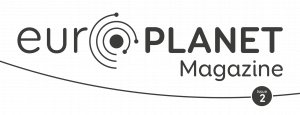Spotlight on Diversity at EPSC2021
The Europlanet Diversity Committee describes events at EPSC2021 to highlight equity, diversity and inclusion.
Read article in the fully formatted PDF of the Europlanet Magazine.
The Europlanet Diversity committee delivered a number of events at EPSC2021, to bring the community together and to share stories and experiences around equality, diversity and inclusion activities.
In a keynote lecture following the conference opening ceremony, Eugenia Coverton described her role and the amazing work of Lecturers Without Borders (LeWiBo), who try to connect international scientists to schools and universities when travelling. Marina Molla then described the integration of LeWiBo in the ‘EPSC goes live for schools’ initiative and the impact this had on school students in 2020.
For the first time we organised a short course, delivered by Dr Moses Milazzo, on how to be an effective bystander when dealing with situations or comments that we know are not right. This included learning when an intervention can help to interrupt inappropriate behaviour and how to do that. The course included excellent examples and tips, and also a lively discussion with the participants. Even those that had attended similar events previously commented that they took away lots of useful guidance with them and they hoped for more bystander-intervention training at future EPSC meetings.
For a second year in a row Arianna Piccialli organised the Planetary Science Wiki edit-a-thon. This started with an introduction given by Camelia Boban (WikiDonne), Ester Bonet (WikiMujeres), and Geert Van Pamel (Wikimedia Belgium) and was followed by almost daily edit-a-thon sessions where participants met to continue to create and translate Wikipedia profiles to highlight diversity within the planetary science community.
For the third consecutive EPSC, a dedicated session on diversity in planetary science was also part of the conference programme. This session showcased a wide range of topics aiming to foster debate within the planetary sciences community.
Several presentations analysed the demographics and the statistics of under-representation (gender, cultural, ethnic origin and nationality biases) with a focus on the impact of Covid-19. We also discussed best practices to promote a more diverse and inclusive environment both within the scientific community and in schools.
Another event organised this year was a screening of the documentary ‘Can we talk?‘ by Dr Kendall Moore. The film focuses on the issue of social belonging in the context of STEM (Science, Technology, Engineering, and Maths) and the effect it has on the lives of under-represented people of colour. After watching the film, we discussed these issues with Dr Tana Joseph and Dr Leonardo dos Santos, who shared their perspectives on the barriers that scientists from minority backgrounds still encounter when becoming part of our community and strategies to overcome these challenges. These are difficult conversations that must, nevertheless, be had if our field is to become as welcoming and diverse as it can be.
Finally, we organised a round table event to discuss key and current issues facing the community. This open discussion gave community members the opportunity to feed their ideas and concerns into the Diversity Committee and Europlanet Society. We talked through some of the issues around different ways in which the community could come together (e.g. face-to-face versus online, versus hybrid events) and then challenges and advantages of each of those options for different parts of the community.
The community input from this will be used to focus the Committee’s attention for the coming months. Anyone wishing to provide input, who was unable to attend EPSC and the event, can send an email to diversity@europlanet-society.org.


